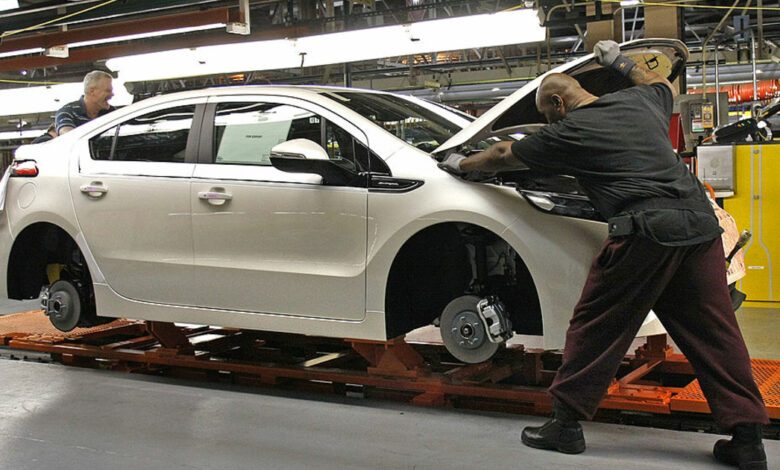Manufacturing industry leaders weigh in on need for more talent in electric vehicle transition

Electric vehicles are becoming an integral part of Michigan’s manufacturing sector, but there are technology barriers and skill shortages that make it difficult to fully embrace the transition away from cars that run on gas.
The automotive industry will have to be invested in training and educating the future workforce, from kindergarten through college, about the modern manufacturing sector. That’s according to a panel of three speakers invested in Michigan’s manufacturing who spoke Thursday at the Detroit Regional Chamber’s annual Mackinac Policy Conference.
The panel was hosted by the Society of Manufacturing Engineers (SME), a nonprofit based in Michigan and focused on policy, industry and academic solutions to issues in the transition to EVs.
The panel included U.S. Rep. Haley Stevens (D-Waterford Twp.), SME Chief Workforce Development Office Jeannine Kunz and Ann Thompson, a manager of workforce development at Ford Motor Co.
Their conversation mainly focused on the challenges and possible solutions to finding and retaining manufacturing workers. Kunz said the number one variable that indicates an entity’s competitiveness is access to talent, emphasizing the importance of finding workers for Michigan to be competitive on the EV front.
“We are in a technology revolution yet again,” Stevens said. “It’s aggressive and it’s asking a lot of us, and we’ve got to meet, frankly, the moment which is allowing these workforce partners, alongside companies big and small, to take the time to train.”
Kunz spoke about how perceptions of manufacturing have made it harder to recruit young people. She mentioned how early education tours and teaching about manufacturing could help young people see it as a viable career.
“Careers in manufacturing, and the auto industry, have changed and evolved quite a bit,” Kunz said.
Thompson agreed, explaining more people would probably be excited by manufacturing if they were able to see the plants and gain some experience in them. If this access was available to high school students, it could help individuals who may not be interested in pursuing a four-year degree find a career path.
While providing educational programs for universities may have been philanthropic in the past, it is now critical to connect with colleges, high schools and other educational pipelines to find and train employees who know the necessary skills for working in an EV plant, Thompson said.
“It’s that access piece,” Thompson said. “When students are in high school, they need to have an opportunity to understand what this looks like. And maybe that’s through work-based learning, maybe that’s dual enrollment, maybe that’s CTE (career and technical education), things that help them have that experience.”
Stevens said that if she could solve one problem associated with the transition to EVs, she would want to put more money into schools to pay teachers and for educational programs.
A primary concern with the transition to more EV vehicles is that previous manufacturing skills won’t be transferable to the new processes. Thompson said increased training, both internally and externally, can help people feel more comfortable with the new skills, like solving problems, thinking critically and comprehending data.
“We are very proud of the thousands of people we employ and we want to continue that work,” Thompson said. “In order to do that, we have got to work with those local ecosystems to get people upskilled and reskilled.”
There are other ways to find new talent outside of current workers, according to the panel. Stevens spoke about the importance of finding diverse talent, like women, to embrace the needs of a new EV industry.
“We in the United States of America are leaving talent behind,” Stevens said. “We’re leaving talent behind demographically and also geographically. …We have populations that need to be plugged in.”
Additionally, Stevens expressed support for reforming immigration policies so that talented workers from all over the world could help the U.S. manufacturing industry stay competitive.
“Staple green cards to degrees,” said Stevens. “What happens is we train the talent and then let it go.”
Thompson also spoke about another potentially untapped talent pool: people who don’t have a high school diploma or equivalent education. She said Ford, and many other manufacturers, require a high school diploma to work in the plant. However, she said expanding the eligibility for employment could help address shortages. Thompson also added that if high school students were exposed to opportunities in manufacturing, they could be more motivated to complete their education.
Once employers find talent, they also have to keep them, which Kunz says is a big problem right now.
She said it was important for employers to train their workers and give them benefits, like increased flexibility. Stevens echoed that later on, saying policymakers needed to ensure benefits like paid leave and childcare were made available for workers.
While manufacturers will need workers, they will also need to invest in new technologies for EVs and other modern products, like semiconductors.
Federal funding, like the Inflation Reduction Act, has been made available to stakeholders, like businesses and local communities, and Stevens said this mechanism helps with the necessary rapid transformation of technology and skills.
“We have learned a lot of lessons over this rocky road, in some respects, that has been the beginning of the 21st century, somewhat unprecedented. An attack on our nation just as the century began, a Great Recession, a pandemic. And yet at every stage, we’ve seen the investments grow and the co-investments match it as a result,” Stevens said. “That is very exciting. Do we get it right every single time? No, but we can’t just sit here and do nothing. We’ve got to bring everyone along with us.”
Disclaimer: Lucy Valeski’s mother is a regional manager with Ford.



